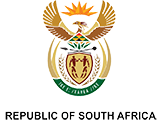From The Desk Of The President, Monday, 13 September 2021
Dear Fellow South African,
A year before the first democratic elections, President Nelson Mandela wrote an article in Foreign Policy magazine on the new South Africa’s future foreign policy.
Reflecting on the shifts in global alliances brought about by the end of the Cold War, he wrote that countries would have to “recast their nets” if they were to reap any benefit from international affairs.
Since the tectonic shift of 1994 when we made a decisive break with not just apartheid but the international relations outlook of its architects, South Africa’s foreign policy continues to be characterised by this “recasting the net”.
Our foreign policy priorities are regional political and economic integration, pursing African development, multilateral engagement and the promotion of democracy, peace and human rights.
To this end we have forged strategic alliances with both the countries of the Global South and mutually beneficial cooperation with the countries of the North.
Joining the BRICS group of countries in 2010 was a milestone in our quest to advance our own national development priorities by forging stronger ties with the important emerging economies of Brazil, Russia, India and China.
Put into context, BRICS countries comprise roughly 41% of the world’s population and account for around 24% of global GDP and some 16% of global trade.
We have reaped the benefits of membership of this important bloc, most notably in the area of economic cooperation.
Bilateral trade has grown, particularly with China and India, with commodity exports and manufactured goods imports featuring strongly.
The BRICS countries continue to be important sources of foreign direct investment in key such as mining, automotive, transportation, clean energy, financial services and IT.
A 2018 review of our BRICS membership by professional services firm Deloitte noted that BRICS partners “invested three times more capital in the country compared to the seven years prior to 2011”. These investments and projects have in turn led to significant job creation.
Since the formation of the New Development Bank, whose regional office is located in Johannesburg, South Africa has been a beneficiary of financing and technical support for projects in transportation, clean energy, environmental protection, water infrastructure and greenhouse gas emissions reduction.
Since the outbreak of the COVID-19 pandemic, South Africa has received $2 billion in funding from the New Development Bank under the COVID-19 Emergency Loan Programme to fight the pandemic and to support our economic recovery.
There has also been substantial cooperation with our BRICS partners in securing personal protective equipment and cooperation around vaccine access and distribution.
Last week we participated in the 13th BRICS Summit, where BRICS countries agreed to deepen cooperation to fight COVID-19 and mobilise the political support and financial resources needed to respond to future pandemic preparedness.
This includes the establishment of a virtual BRICS Vaccine Research and Development Centre and a BRICS Integrated Early Warning System to forecast future outbreaks of infectious diseases.
Another important area of agreement was on mutual recognition of national documents of vaccination and systems of COVID-19 testing – something that will be vital to cross-border travel in the future.
The concept of mutually beneficial cooperation will be particularly important in the global economic recovery, where unequal development means that some countries will bounce back quickly, while others will lag behind.
In support of economic recovery, BRICS partners agreed to strengthen collaboration in catalytic sectors such as energy, IT, science, technology and innovation, agriculture and the green economy. These are all important sectors identified in our Economic Reconstruction and Recovery Plan announced last year.
Cooperation with other BRICS countries, particularly in the field of innovation research, will help to accelerate our country’s industrialisation and help us meet our Fourth Industrial Revolution aspirations. In this regard, discussions were held around the creation of formal BRICS platforms to share best practice, knowledge and expertise, including the use of open source technology platforms.
The BRICS partners agreed that developing countries need assistance to achieve the UN Sustainable Development Goals, and that donor countries should honour their commitments in this regard.
This is particularly important within the context of climate action. Like most countries, South Africa seeks to move towards a low-carbon development path that is inclusive, sustainable and that takes into account our status as a developing country. The BRICS Energy Research Cooperation Platform will be valuable as we move to diversify our energy sources.
In the eleven years since we joined BRICS, our membership has substantially advanced our national interest. Being a member of BRICS has enhanced our position as an important emerging economy. It has given us access to policy and technical expertise of larger and established economies, as well as access to the support of the National Development Bank. It has strengthened our activism on the global stage, particularly around reform of multilateral institutions.
We have benefitted from being part of a collective voice striving to advance a world order based on mutual respect and the equal sovereignty of nations.
BRICS is of immense strategic importance to our country, and will continue to be so for some time to come.
With best regards,
With best regards,

- Tags:
- BRICS /
- BRICS summit /
- COVID-19 /
- Vaccines /
- Economic recovery


